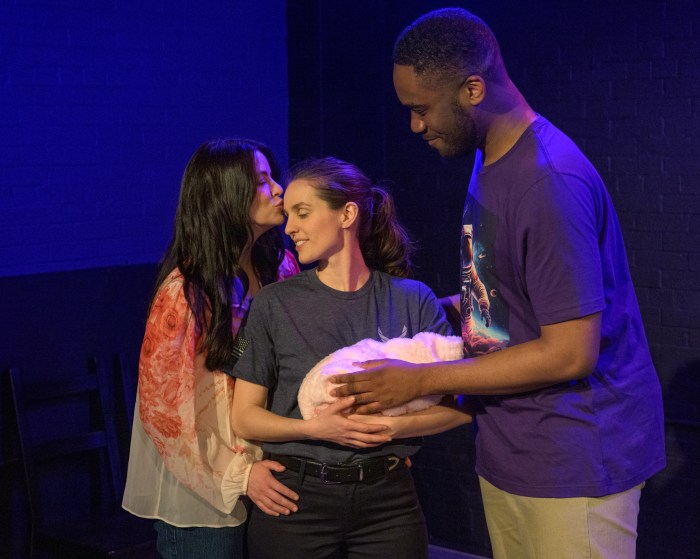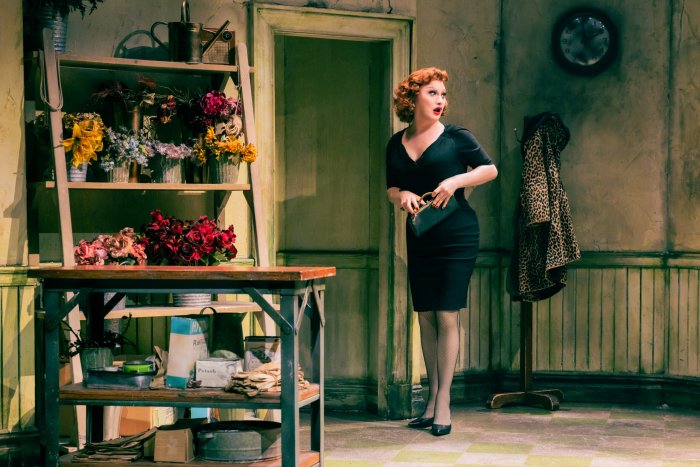Moving to a retro-1950s suburb, trading iPads for Tupperware parties
Are you one of those people who can sync their iPhones with their iPads, but can’t get in sync with true happiness? Do you wonder if, instead of controlling your technological devices, they’re starting to control you? Is the instant gratification from ordering a week’s worth of groceries –– or a sex hookup –– with just a few taps on a keyboard and having them magically appear at your door within minutes starting to feel, well, less than gratifying?
If you answered yes to any of the above, have I got a play for you. It’s called “Maple and Vine,” by Jordan Harrison, and it’s one of the most wickedly whimsical, thought-provoking dramas to examine the downside of “smart” technology and an overabundance of choices in the 21st century.
The premise is fascinating, albeit a bit farfetched. Katha (Marin Ireland) and Ryu (Peter Kim) are an attractive yet unhappy young couple living in New York. Katha hates her publishing job and suffers from chronic insomnia; Ryu is run ragged as a cosmetic surgeon, performing procedures on desperate women who don’t need them. They’re reeling from the loss of a miscarried child plus the demands of an increasingly harried, spiritually empty existence.
Sure, their devices can connect them with nearly anything they want, but they still feel disconnected from each other.
When Katha meets Dean (Trent Dawson), a chipper fellow in a retro suit, he invites the couple to join a rigorously detailed 1950’s re-enactment community somewhere in the Midwest, offering the promise of a simpler, more fulfilling life. No cell phones. No Google. No Starbucks venti nonfat hazelnut lattes. Just good old-fashioned values, like the rewards that come from hard work, home cooking, and caring about your neighbors.
Along with his prim, self-possessed wife, Ellen (the marvelous Jeanine Serralles), the dapper stranger convinces Katha that their society of latter-day Luddites really works.
Indeed, it has shades of the soulless perfection of “Stepford,” the rabid homogeny of “Pleasantville,” and even the taboo-busting scandals of “Peyton Place.” Rather than some idyllic-evocative name, they refer to their community by a sterile acronym, SDO (Society of Dynamic Obsolescence).
If much of the plot is predictable, it’s also highly amusing. Ryu initially thinks the idea is ludicrous, but his wife convinces him to go for a six-month trial. Once there, they begin to enjoy the pleasures of hosting cocktail parties. Katha changes her name to the more ‘50s-friendly “Kathy” and she’s proud to serve homemade pigs-in-a-blanket and crab puffs. Ryu gets a job in a cardboard box factory and becomes a top producer.
To help keep residents in line, there’s an “Authenticity Committee,” of which Ellen is the vice president. When Ryu offers his new neighbors Grey Goose, Ellen is horrified. Smirnoff is the vodka of choice.
Smoking is encouraged, salt is a major food group, and healthy options such as whole wheat bread have yet to be invented. Defending their dietary practices, Ellen says, in all seriousness, “What’s a little hypertension if you’re happy?”
Of course, the simple life is more complicated than they thought. Rigid rules breed a creepy, cult-like conformism. Being a “mixed-race” couple (Ryu is of Asian descent), there’s a certain amount of bigotry. Ryu’s boss, Roger (Pedro Pascal), refuses to give him a raise because he’s “Oriental.”
Fear and prejudice against homosexuals is also evident. A racy, somewhat jarring plot twist — which I cannot disclose here — adds a much-needed kick to the proceedings.
Understandably, with such an exaggerated concept, loose floorboards in logic can trip up the drama. But under the inventive direction of Anne Kauffman, the performances are first-rate (with the exception of Kim, who seems tentative and stilted), and enough emotional power comes through. Tension is sustained with a basic question: will they stay or will they go?
The proselytizing is not limited to Dean and Ellen’s efforts to recruit and maintain members. A kind of fractured morality tale, “Maple and Vine” is not afraid to shout its messages. It asserts that today’s technology and too much choice can be overwhelming, if not outright damaging. When it’s so easy to get what you want, you may no longer want anything. Limitations are actually a relief. Responsibility is healing.
In comparing contemporary society to their fantasy “Ozzie and Harriet” enclave, Dean observes, “We may seem behind bars to them, but to us, they are behind the bars.”
Such insights were apparently lost on more than a few theatergoers, who, instead of reflecting on the play, whipped out their smartphones and frantically typed away before the curtain call even finished.
Essentials:
MAPLE AND VINE
Playwrights Horizons
416 W. 42nd St.
Tue. at 7 p.m.; Wed.-Sat. at 8 p.m.
Sat. at 2:30 p.m.; Sun. at 2:30, 7:30 p.m.
Through Dec. 23
$70; ticketcentral.com

































